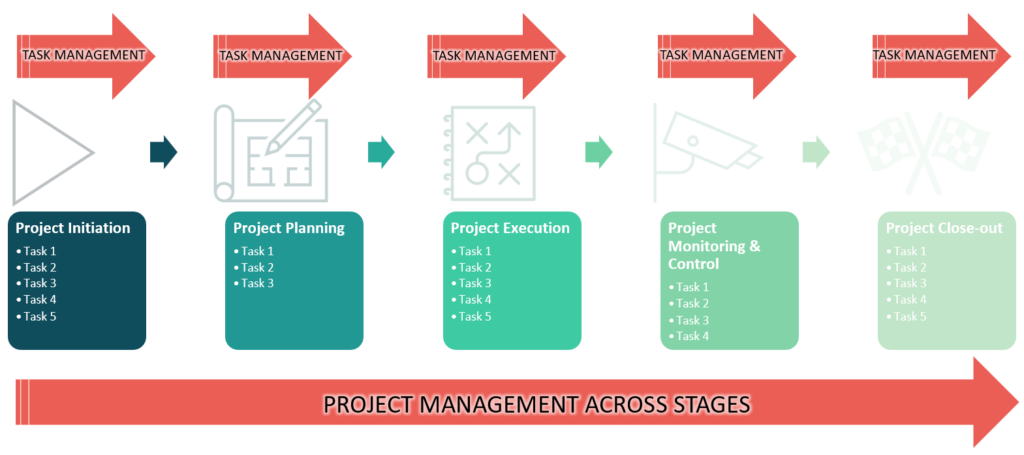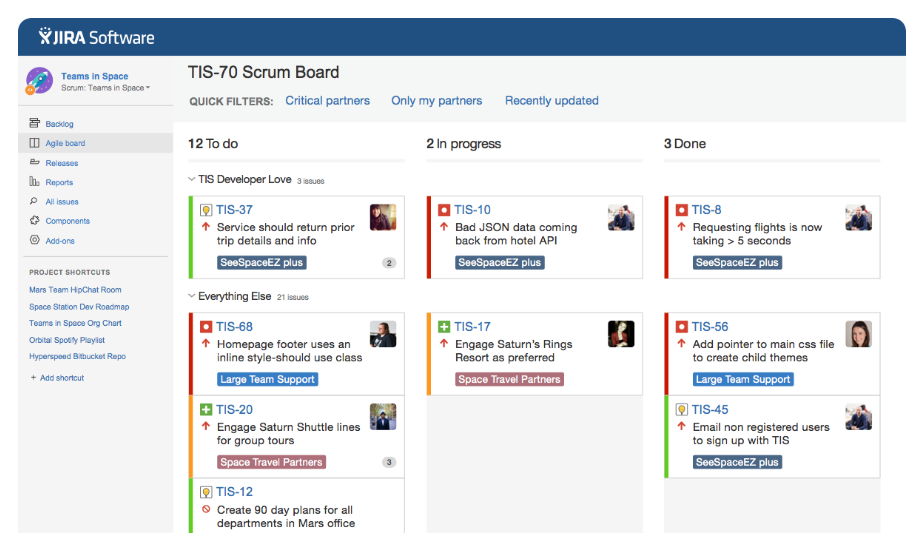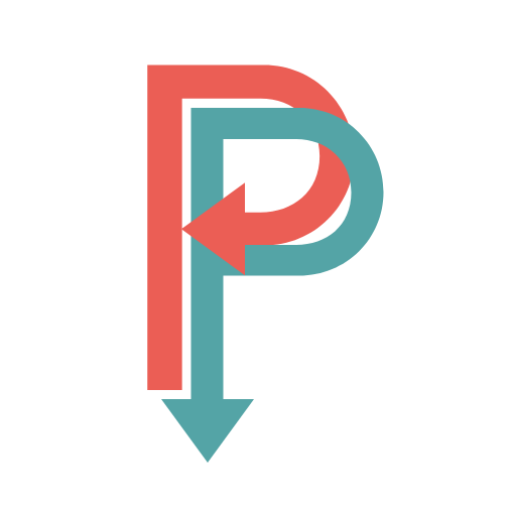Introduction
Comparing Task Management and Project Management might seem simple, but I’m always surprised by how many people are unclear on how to compare the two. Being a Senior Project Management professional, many personality types I work with tend to be technical, analytical, and meticulous people (like me).
However, one of my biggest strengths (and weaknesses) is being a stickler regarding the details. I call this a weakness because it sometimes ends in what you may have heard of before, “analysis paralysis.” Getting too bogged down in detail can cause delays, and project delays are never a positive thing.
This is why it’s essential to compare what are defined as “tasks” and those as “projects” to separate the smaller portions of work from the bigger ones. Think of this as a chef preparing an excellent gourmet meal.
The ingredients that the chef will use are made up of the “tasks,” and the final dinner, plated to the customer according to their exact liking (requirements), is the “project.”
Of course, both are important in their own right and are ultimately edible, but how these ingredients are put together will define just how successful the project (the meal) is.
You might also be interested in: Account Manager vs Project Manager Roles Compared: Main Similarities, Differences, Skills, and Responsibilities
My Bottom Line Up Front
My advice is to keep things simple when managing tasks and projects. Focusing on the fundamentals of task management, you can make project management more effortless. Take advantage of online tools to manage your tasks and keep track of your time.
Mastering task management skills such as time management and communication can help you become a great project manager.
Main Differences Between Task Management and Project Management
Before we look at the differences between managing a task and a project, we need to break down what each means in the IT Project landscape.
A task in Project management is a “unit” of work that needs to be completed by a specific date, and this will be a portion or component of the deliverable output.
Multiple tasks will make up a project, which will vary based on the priority of what needs to be completed. For example, let’s consider something like website development. The client would expect a fully functional website with multiple pages, banners, features, buttons, and tools.
We can call the banner design a task as part of this. Creating the banner according to the client’s needs would be a task. Executing this alone will not result in the website being complete and functional.
On the other hand, a project will be the final result comprised of all the variable completed tasks delivered on a specific date. In the example above, the complete website itself.
You can see in the diagram below how the two are complementary and not mutually exclusive.

The Main Differences Between Project Management and Task Management:
- Task management is the execution of small units or deliverable items, whereas project management comprises several deliverables that must be completed.
- Task management is the responsibility of the person to whom it’s assigned, whereas the project is the project manager’s responsibility.
- A task usually carries a relatively low risk if incomplete, whereas a project would be considered a much higher risk.
- Task management usually refers to a set of items that each person needs to complete in their capacity, whereas project management refers to a bigger goal that needs to be executed by multiple people.
- Tasks may not necessarily have strict deadlines, whereas projects will undoubtedly have definite inception and expected completion dates.
- Tasks are usually executed by several people within the project team, whereas the project is managed by the project manager, who is responsible for the total output.
Key Features of a Great Task Manager
I’ve worked with several different teams and members across multitudes of projects. Those are both IT and non-IT related. Regardless of the role, what stands out is how well someone can manage their deliverables.
I mentioned above that task management is not assigned to only one role within a project; each individual will be responsible for their own tasks.
Let’s use the example above for a project like website development. In that case, we can see how these individual tasks will vary according to priority and type:
- The business analyst may be responsible for documentation, translating the brief to the developers, and liaising with the rest of the business stakeholders.
- The developer may be responsible for ensuring the buttons work when clicked and link to different website pages.
- The creative designer must execute the design, banners, and graphics according to the customer’s corporate identity and preferences.
- The project manager must oversee all these individuals and tasks and ensure they’re tracked and managed on time.
Here are My Critical Skills for Effective Task Managemen
No matter your role, the skills listed below are essential for excelling in your delivery field.
- Understanding requirements and asking (the right) questions is hugely important. For example, suppose the designer creates a website banner without considering the customer’s corporate identity. In that case, the task becomes pointless since it must be redone to meet the customer’s needs. Therefore, understanding the brief and eliciting the correct information is a core skill when managing your dedicated tasks.
- Time management is a no-brainer (or perhaps it’s not). I’ve always felt that the project teams I’ve worked with have specific individuals who can manage their time effectively and will generally outperform those who don’t. Tasks are subject to change and approvals; delivering these ahead of time can be beneficial as it allows a healthy gap for any changes that may need to be factored in. Prioritization is part of this, so you must know which tasks should be completed first or which carry the most risk or dependencies.
- Knowing when to use your specialized skills and when to delegate can ensure that you deliver quality outputs on time. For example, I’ve been guilty of wanting to take on too many tasks within a project as I feel that it lessens the burden on others. Unfortunately, in some instances, the result means you’re either not going to meet the deadline or take longer to execute something that might take another person less time. On the other hand, in a well-structured project team, individual autonomy and the ability of specialists to own their tasks are significant. As a project manager, I’ve learned that delegating the right tasks to the right specialists will always yield better results than trying to do them all myself.
Pros/Cons of Task Management
Task management can get quite granular; let’s look at some general upsides and downsides to managing tasks.
These are my pros and cons:
Pros
- Task management is excellent if you love being busy with various things daily.
- I love the ability to constantly learn new skills, as every project will have varied tasks that will need to be completed.
- As more tasks are assigned, the ability to work under pressure and organize effectively will be tested. Task managing effectively is a skill you can apply outside of work; becoming good at it is a great tool!
Cons
- On the converse of this being an exciting opportunity for learning, it can be rather frustrating when being allocated assignments you’re not good at or don’t know how to do.
- Some individuals I’ve worked with have struggled with time management and deadlines with their tasks. These inconsistencies can impact your delivery if your tasks rely on each other for a shared outcome.
- Some parts of task management can be pretty administrative and mundane, and you must ensure that more straightforward tasks are executed as quickly as possible.
Key Features of a Great Project Manager

While the skills above are essential for your role, project management skills are more directed at the project as a whole. Therefore, let’s look at project management skills in the context of task management.
Here is a Quick List of Critical Skills of a Project Manager
- Regardless of the more detailed focus on each deliverable, your ability to “see the bigger picture” is crucial. I love focusing on the outcome and working backward to break down all the tasks. Being a Senior Project Manager means that I am responsible not only for what I’m working on but also for ensuring everyone is also allocated the correct tasks for their skills. Glancing over the brief and matching my resources to the jobs has taken some time to master, but quickly taking a step back and ensuring the finer details align with the ultimate goal is vital in this role.
- Effective communication and the ability to work with multiple personality types is absolutely essential. Allocating resources to areas or teams where things may not go smoothly, communicating, and ensuring the team understands what is required are core skills that not all project managers possess and something that can continuously be improved and adapted.
- Ability to work under pressure and problem-solve. In task management, focusing only on what you’re doing without consulting with the team is possible. On the other hand, project management means you’ll need to consider all tasks, roles, and variables simultaneously. If deadlines are going to be at risk due, you need to be able to view multiple solutions to avoid mitigating risks and offer an alternative. It’s essential to be calm and collected to be proactive and not reactive to stressful situations.
Pros/Cons of Project Management
Pros
- Every project I’ve managed has been different, even when delivering the same product set. The diversity in every project and team is something that I love in this role.
- You will grow and learn from every difficult situation. Challenges are inevitable in this role; they are all valuable learning opportunities for you to grow and learn as your career progresses.
Cons
- The client and often stakeholders will hold you responsible for the on-time delivery of the product or project. I’ve certainly had to become a little more resilient as my role became more senior to deal with challenging personalities and deadlines.
- Sometimes the teams you will be managing can be unprepared or unskilled, making delivery difficult. Again, effective communication is helpful, but you may have to adapt quickly and carefully in these situations.
Task & Project Management Tools
Great! We know the difference between task and project management, but you may still need help figuring out how to get started.
I can promise that for every successful project I’ve worked on, the teams have used software tools that enable this to happen seamlessly! So, like Cinderella and her team of woodland creatures putting together her princess outfit, the project team needs something magical to tie things up.
There are many out there, but here are two of my favorites!
Atlassian’s Jira
She’s not pretty, but she’s functional! I care more about function over looks, but that’s not true for everyone. When I train new incumbents on this platform, I find there can be a little apprehension as it’s not the most intuitive tool.
However, Jira is a highly configurable project management tool for those working in an Agile methodology or using development sprints. In addition, the view options can be useful for those requiring quick overviews of Kanban boards or Gantt charts.

ClickUp
She’s sleek, she’s collaborative, and she’s brilliant!
As a result, ClickUp is fast becoming more popular among both IT and Non-IT users.
It has great features and practical, ready-to-use templates for various business areas. ClickUp is excellent if you’re new to task or project management and unsure where to start. It works well when you need an app that offers more than task and project management. I use ClickUp for task tracking, CRM, knowledge hub, time-time sheets, and sprints across teams.
You can have a look at the task management feature right here:

Other Alternatives to Consider
Still, trying to figure out where to start? Don’t worry; there are plenty of online courses to help you. For this article, I will not dig too deep into the plethora of methods for project management as there are many free and paid-for courses and certifications available.
Instead, start with effective task-management strategies, enabling you to become a great project manager.
Udemy
I love Udemy, and it’s easy, well-priced, and reviewed by multiple people worldwide.
Here’s a best-seller for you to get started with: Time and Task Management: Time Management Techniques
Yes! LinkedIn is for more than just business. LinkedIn Learning has some excellent free resources and has become one of my handy tools for free short courses in a particular area.
- Here are some Time Management topics you can scroll through: https://www.linkedin.com/learning/topics/time-management
- They also cover a wide range of Project Management short courses based on specific project management topics: https://www.linkedin.com/learning/search?keywords=project%20management
Project Coordination and Project Management FAQs
Answer: Task management is assigned to multiple project team members, including the developers, the project manager, the project coordinator, the support team, and even business stakeholders.
Answer: No, while the online tool will undoubtedly make things easier to manage, it’s not critical. You could use whiteboards and sheets or Microsoft Excel to track project details. However, with many team members being based in various locations, I find it’s pretty tricky in recent times to manage projects remotely, but it’s not impossible. You must rely heavily on excellent communication and documentation for transparency and collaboration.
Answer: Consider these three elements when comparing a project and a task; risk, complexity, and time to execute. For example, if a job is exceptionally complex and will take longer than a couple of weeks to complete, you likely need to break it down into further smaller tasks or chunks of work to be completed. On the other hand, if it’s relatively simple, quick to finalize, low risk, and won’t affect other dependencies, it’s most likely a task and not a project.
Conclusion
I hope that comparing Task Management and Project Management seems more manageable now.
However, when comparing the two, don’t forget to consider how they relate to each other and how the foundations of something like task management can be crucial for the execution of a successful project.
Use free online resources to ensure you’re staying on track and being as effective as possible to provide the best outcome for your project!
Related read
- Types of Project Management Methodologies
- Project Management Glossary of Terms: A Comprehensive List of PM Concepts
- Project Management vs Project Coordination Compared

Tarryn Menzies is a seasoned Senior Project Manager, Agile enthusiast, and the insightful voice behind her expert pieces on Projects Pivot. With a career rooted in hybrid Agile environments, including Scrum, Kanban, and MoSCoW methodologies, her passion for project management is palpable in every article she authors. A certified AgilePM via APMG, Tarryn is well-equipped to delve into the intricacies of project management, leading readers through complex concepts with ease and clarity.
In her current role as an IT Operations & Project Manager, Tarryn consistently achieves a balance of technical proficiency and strategic thinking, making her uniquely suited to interpret the often-intertwined worlds of IT and project management. Her extensive skillset includes Waterfall Project Management, PRINCE2, and Service Delivery, among other things, demonstrating her versatility as a management professional.
Known for her clear communication and problem-solving abilities, Tarryn has a knack for managing stakeholders effectively, steering complex projects towards successful completion. With proficiency in Project Management Software, Jira, and XML, she navigates the digital landscape of project management with ease. Moreover, her familiarity with SaaS and Business Analysis empowers her to engage with the evolving needs of modern project management and she shares all her real-world insights here at Projects Pivot!


